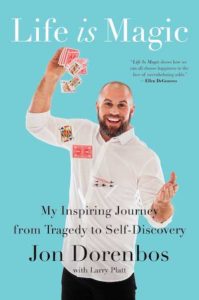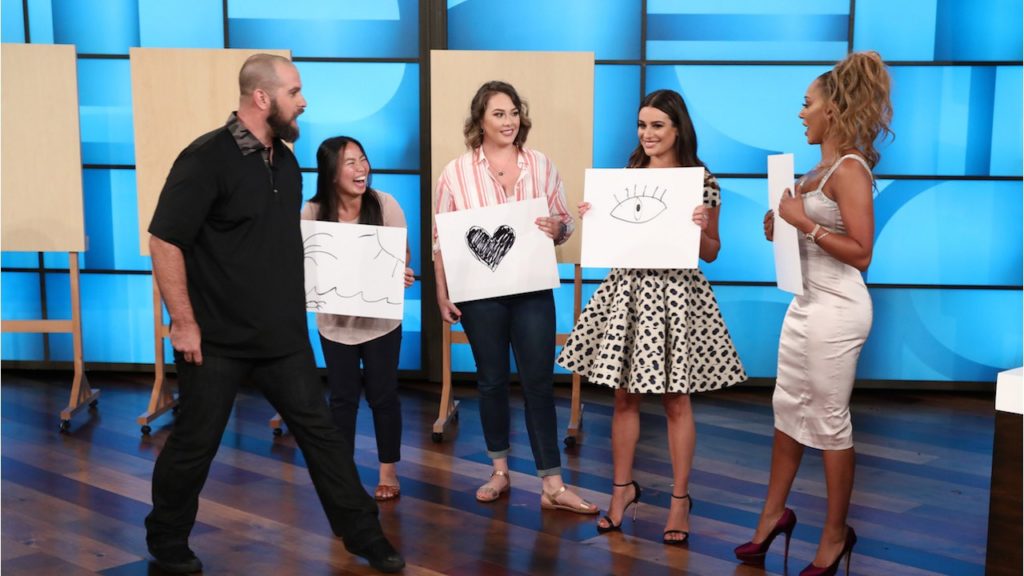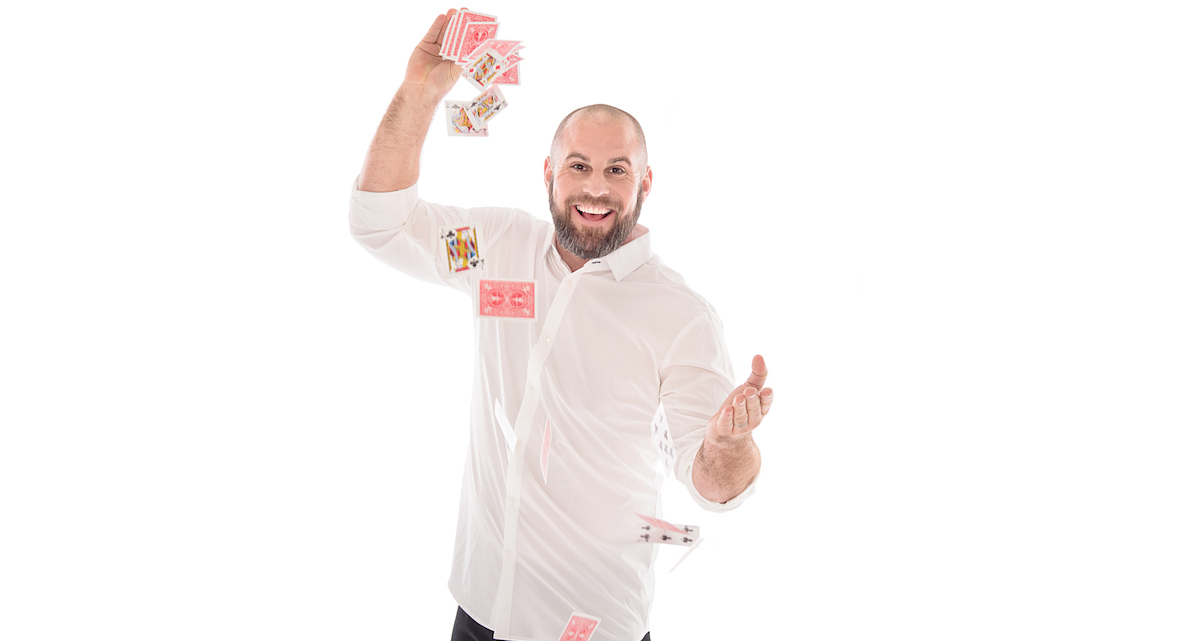Meet Jon Dorenbos: professional athlete who played 15 seasons in the NFL, including 11 as long snapper for the Eagles; magician who’s ultra-engaging performances earned him third place on America’s Got Talent; sought-after motivational speaker who makes regular appearances on Ellen. All these accomplishments after facing incomprehensible tragedy as a kid—his dad murdered his mom and went to prison, leaving him essentially orphaned.
The 39-year-old has several lifetimes’ worth of wisdom to share.
Go to the event Do Something
“I left every meeting with him sort of ebullient about life,” Platt says. “Totally up—he’s just an inspiring character.”
For Platt, one of the most moving parts of Dorenbos’s story actually happened while they were writing the book. When Dorenbos returned to his South Philly condo after emergency open-heart surgery two years ago, the gregarious, still-built football player couldn’t speak above a whisper. “In that whisper he’s telling me about the four weeks of recuperation at Penn on the hospital floor,” Platt says.
“I think of that moment of him in a vulnerable state, talking about how he found purpose in a circumstance where any of us might be in the fetal position,” Platt says. “And he changed the whole atmosphere; it’s a metaphor for how to live your life.”
He and his wife, Annalise, noticed that none of the patients would even look at each other or talk to each other. They were scared; didn’t know what to say. Dorenbos decided that his floor needed a leader—a coach—and that he would step up. In the book, he writes:
We all looked like shit. We’d pass each other going slo-mo in the hallway, but I’d say, “Better slow down there, Speed Racer,” and I’d get a smile, and pretty soon there would be currents of smiles crossing one another in the air, and what had once been a downer of a culture became more upbeat. Every day, on our walks, people would open their doors and wait for us, just to shoot the shit.
“I think of that moment of him in a vulnerable state, talking about how he found purpose in a circumstance where any of us might be in the fetal position,” Platt says. “And he changed the whole atmosphere; it’s a metaphor for how to live your life.”
For more Dorenbos inspiration, see him live next week and check out this excerpt from the book, which finds Dorenbos at 22 years old, starring on the gridiron at the University of Texas-El Paso and wrestling with whether forgiving his Dad would be tantamount to betraying his Mom.
Monday, November 18, 7:30pm, Tickets $15, Parkway Central Library, 1901 Vine Street.

From Life is Magic: My Inspiring Journey from Tragedy to Self-Discovery
by Jon Dorenbos with Larry Platt
A football locker room is as diverse a setting as you’re going to find. We had good ol’ boys from the heart of Texas, inner-city African Americans from the mean streets of St. Louis, and sons of Bible Belt preachers. Sure, we all shared in the pursuit of winning on the field, but locker room cohesion, I found, also needs guys like me: loud, positive, funny characters who could create moments that turn into memories.
 I had an ability to get along with people. Remember, I had been bullied as a chubby kid, and that conditioned me to always treat everyone I came across with respect. If you were different from me, I was going to make the effort to reach out to you, to put you at ease. In a football locker room, with all those stoic tough guys, someone needs to fill that role. Team chemistry is a real thing—and thanks to my magic and the fact that you just can’t stop me from cracking jokes, I realized that part of my role was keeping our team together.
I had an ability to get along with people. Remember, I had been bullied as a chubby kid, and that conditioned me to always treat everyone I came across with respect. If you were different from me, I was going to make the effort to reach out to you, to put you at ease. In a football locker room, with all those stoic tough guys, someone needs to fill that role. Team chemistry is a real thing—and thanks to my magic and the fact that you just can’t stop me from cracking jokes, I realized that part of my role was keeping our team together.
For me, being positive was not only becoming a way of life but also a philosophy to believe in. When I believed my own hype about being a long snapper and then willed it to become reality, it was proof of the power of positive thinking. And when teammates crowded around my locker, craning their no-necks trying to figure out where the hell that card had disappeared to, it underscored a related truth: people want to be around positive, upbeat people.
Now, don’t get me wrong, a meathead long snapper with a deck of cards didn’t make all this stuff up. Ever since Norman Vincent Peale’s bestselling self-help book The Power of Positive Thinking more than sixty years ago, millions have used techniques like visualization and daily affirmations to achieve their goals in life. In more recent times, psychologist Martin Seligman turned positive thinking into a science. Now there are reams of studies showing that negative thoughts and emotions limit the brain’s ability to consider possibility; they literally result in small-mindedness. Positive thoughts and emotions—joy, love, laughter—expand the mind’s sense of the possible.
I knew none of this back when I was sprinting like a madman down a college football field. But I was living it. Which isn’t to say that I always practiced what I’m now preaching. I’ve always been outgoing, always liked to make others laugh and smile, but as my time at [University of Texas-El Paso] went on, I started to become aware of a vague, nagging feeling following me around.
On the field, I was killing it. But . . . something was wrong. It wasn’t a thought so much as a feeling. Maybe it was related to the fact that we weren’t winning or that I was pretty banged up every day. But I think it was more spiritual than that. There wasn’t any one thing wrong that I could put my finger on; it felt like I was struggling to get in touch with myself, like there was an emptiness inside. Making a big tackle or entertaining a group of friends with my magic would quiet it, but the feeling kept returning. Therapy taught me to interrogate myself: What’s this about?
Buy the bookDO EVEN MORE
Ever since, this was our spot, me and Mom. I’d often come to it, right at the base of the lifeguard stand, to hear myself talk to her. Sometimes I’d update her on my life: What girl I was hanging with, how the season was going. Other times, I’d tell her what Krissy was up to, or I’d relay some funny story about Susan. Now, having been led to our spot by that vaguely unsettled feeling, I found that the words just started to come, as if on their very own, and it was some real talk.
“Mom, don’t get mad,” I repeated, tears starting to stream. “I’m not picking sides. I swear I’m not.”
“You know what?” I said. “I want more in this life. I don’t want to be somebody who lives in circumstance. I want to be a person of vision.”
And what’s been keeping me from becoming a person of vision? Sitting there, I instantly knew the answer. Suddenly, mysteriously, I was able to identify the cloud that had been hanging over me.
For years, I’d told people that I’d forgiven my dad. But had I? And, if not, why not?
“Mom,” I said, my throat catching and burning, “don’t get mad.”
I remember looking up and realizing that part of what I was feeling was . . . guilt. To become that person of vision meant that I’d have to forgive my dad. Really forgive him. And what I was wrestling with—that cloud—was really fear. Fear that forgiving him meant I was being disloyal to Mom.
“Mom, don’t get mad,” I repeated, tears starting to stream. “I’m not picking sides. Watch Dorenbos do magicVideo
I looked around. Someone was walking a dog. A couple of dudes tossed a Frisbee around. Man, I’d been bearing all this weight, and I hadn’t even been aware of it. No one gives a shit, I realized. “Let me get rid of carrying all this around with me,” I said—pleading. “I just want to keep the goodness of you. If it were me in Heaven, looking down on my son, I’d be like, ‘Hell, yeah, rock on, bro. Do what you gotta do.’ If I want to be the man I think you’d want me to be, I gotta ditch this cloud that’s always following me around.”
Forgiving someone doesn’t mean they win. To the contrary: letting go of bitterness and guilt frees you. Do it for yourself.
I sat there a good while, feeling close to Mom. Finally, I stood, took a deep breath, turned, and began making my way back to my truck in a nearby parking lot. As I walked, I could feel myself actually getting stronger. I noticed a bounce in my step. I literally felt lighter. I broke into a smile when it dawned on me: Mom pulled me here. She wanted to kick me in the ass a little: Dude, there’s something weighing on you. Just let it go, man.
I didn’t know then just how transformative real forgiveness is. “The weak can never forgive,” Gandhi said. “Forgiveness is the attribute of the strong.” Today, I can’t tell you how many people tell me they can’t forgive someone who has wronged them. I tell them to stop keeping score, man. Forgiving someone doesn’t mean they win. To the contrary: letting go of bitterness and guilt frees you. Do it for yourself.
That’s what I learned that day on the beach. Gandhi had it so right. By the time I got to my truck, I felt . . . stronger. I swear the cloud had lifted. I felt like I’d just grown up a little. As I began driving, I talked to Mom again. “I’m going to be okay, Mom,” I said. “Whatever happens, I know now I can figure shit out. I’m always going to be able to figure shit out.”
Excerpted from Life Is Magic by Jon Dorenbos with Larry Platt, used by courtesy of Avid Reader Press, an imprint of Simon & Schuster.





